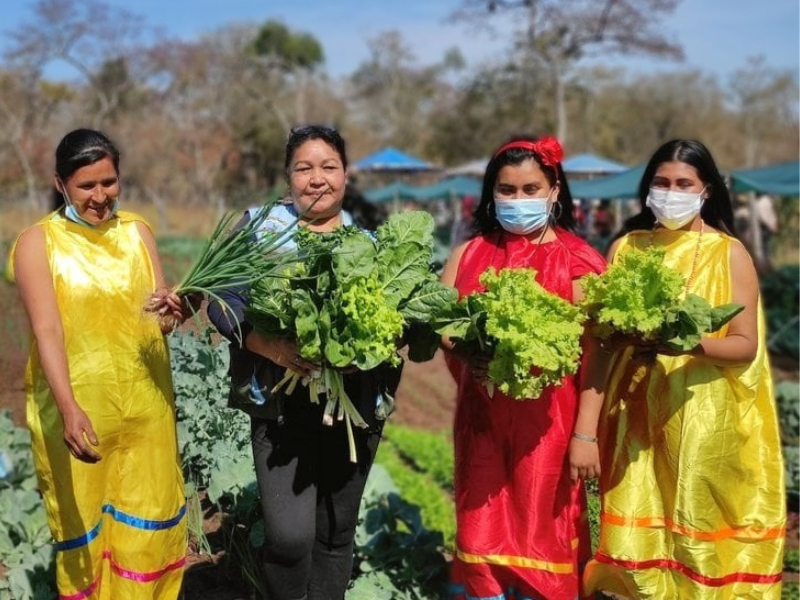
Agroecological orchards in the community of Timboy Tiguazu. Photo: Center for Regional Studies for the Development of Tarija (CERDET), Bolivia
Article by Rocío Corrales published by Muy Waso [1] in Bolivia, republished and edited by Global Voices under a media agreement.
Going to the market, buying groceries, and preparing meals are not simple tasks. But these are even more difficult when living in the Bolivian Chaco: without water, at a temperature of almost 40 degrees Celsius, and far from urban centers.
This context threatens the food security [2] of the inhabitants of the Bolivian Chaco, especially that of its Indigenous communities. During the last years, the Bolivian Chaco experienced critical levels of drought [3].
The Gran Chaco is a region in South America, spanning parts of several countries, including Argentina, Paraguay, Bolivia, and Brazil. It is one of the areas with the greatest biodiversity and is characterized by its unique ecosystem. Several Indigenous communities live in this region, such as the Guarayos, Ayoreos, Chiquitanos, and Guaraníes.
Climate change is impacting [4] the Gran Chaco which in recent years has been affected by devastating forest fires and severe droughts that put the population's water and food security at risk.
During 2022, as a local response to this climate crisis which caused low agricultural production, the Guaraní community of Timboy Tiguasú in the Department of Tarija of southern Bolivia implemented a model of sustainable food production.
More than 120 Guaraní women from this community led the organic production of food in order to have healthier and more nutritious diets. Nowadays, they work daily in their gardens, harvesting eight types of horticultural crops, pouring them into pots, and serving them on plates.
Crop management emphasized polycultures as family-focused and as a way of building resiliency. On the plots of land each row has a different variety of vegetable.
This distribution of crops managed to control 87 percent of pests and diseases without using pesticides.

Agroecological orchards in the community of Timboy Tiguazu. Photo: Center for Regional Studies for the Development of Tarija (CERDET), Bolivia
Harvesting water, an ally of family farming
In addition, this proposal for an Agricultural Productive Model relied on efficient water management. This is a process that involves the harvesting, storage, and distribution of rainwater by seasons.
Ditches were dug to collect rainwater, which was then stored and distributed in the soil through pipes in the sprinkler irrigation system, simulating rain.
“The community did not have access to vegetables to prepare their food. With this project, we managed to demonstrate that, through an agroecological production model, healthy food can be harvested in the Chaco despite the climate crisis,” says Ricardo Paita, responsible for the project and the Center for Regional Studies for the Development of Tarija (CERDET [5]).
To counteract the effects of climate change, climate action can be leveraged through alternative production, distribution, and consumption of healthy and sustainable food.
The Implementation of a Resilient Agricultural Productive Model as an innovative and effective adaptive alternative to climate change project was financed by the Fundación Avina [6] in partnership with Voices for Climate Action [7] (VAC).
Currently, educational centers and other Indigenous communities are replicating this productive model and highlighting the need to produce food sustainably and without pesticides.